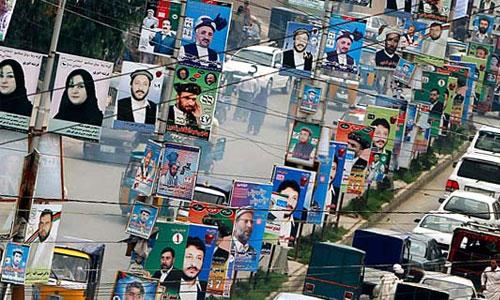The upcoming parliamentary elections campaigns officials kicked off on last Friday night with many candidates decorated the whole city with billboards, pictures and posted videos and pictures on social media platforms. More than 2,500 candidates, including 400 women, will compete for 249 seats in Afghanistan’s parliament. The vote for the Wolesi Jirga, the Lowe House of parliament, is scheduled for October 20. However, it remains unclear if voting will take place in areas held by the Taliban.
The first parliamentary election in the post-Taliban Afghanistan was held in 2005 while the second parliamentary polls took place in 2010. However, the third parliamentary polls, originally set to be held in early 2015 following presidential elections, were repeatedly delayed. The electoral campaign will end on Oct. 17 to give way to a two-day election silence.
In accordance with the Afghan electoral law, a series of principles and restrictions must be respected by the candidates, including the neutrality of organization and places for holding speeches, the impartiality of the national and private media, and transparency of the election campaign at the level of funding sources, as well as equity and equality of opportunity among all candidates.
According to IEC officials, more than 60 has been fined from 30,000 to 100,000 AFs over early campaigns. “Posting speeches on social media during the electoral campaigns that can damage national unity and promote ethnic, tribal and lingual differences are in contravention of the law,” said Mohammad Rafi Rafiq Sidiqi, head of the IEC media committee.
However, Kabul residents complains that many candidates have installed their photos on walls of their houses and other places that they are not allowed. Some candidates use street children for carrying their campaigns picture and stick on any walls. According to residents, they should campaign based on the law and should not create pollution in the city and they must not install their banners on any walls, doors and shops without permission of their owners.
Among the candidates from the major tribes in Afghanistan, a number of youths from minority groups were also seen starting their campaigns. Anisa Pashaee said she is the first female candidate from Pashaee ethnic group. She said if she makes her way to the parliament, she will fight discrimination against minorities. “I am from a deprived ethnic group. Maybe other ethnic groups are deprived too. Our Tajik ethnic group is deprived, our Pashtun ethnic group is deprived, because only the powerful people have entered into politics and have filled their pockets only,” said Pashaee.
Another candidate from a minority group is Ajmal Baluchzada whose photos are mostly seen in the central parts of Kabul, according to some residents. “Justice for My Daughter” is his slogan. As quoted, he said he will work for equal justice in the society if he is elected as an MP. Baluchzada criticized the way some candidates carry on their campaigns, saying that the candidates should not disturb the people during their campaigns by installing their photos and banners on the walls of others’ houses.
Anyway, the long disputed election’s campaign has started but still there are challenges that may affect the process. The first and most threatening issue is insecurity which already caused many polling centers to remain closed. Though the Ministry of Interior inform of 54,776 members of the Afghan National Security and Defense Force will be deployed for security of 5,100 polling centers five days ahead of the elections. As quoted from Akhtar Mohammad Ibrahimi, Senior Deputy Interior Minister for Security, this week, there would be 9,540 reserved forces.
The second issue is the bitter experience from election fraud; however, the Afghan government and IEC have agreed to use biometric system for the upcoming election – which will be the first time for Afghanistan to experience this technology for the electoral process. The use of new technology is a great development in Afghanistan.
The international community is pushing hard for the vote to happen before November’s ministerial meeting in Geneva, which the United Nations says is a “crucial moment” for the Afghan government and its foreign partners to demonstrate progress. International donors are determined that the parliamentary elections timetable should not slip any more, despite continual setbacks. The UN Assistance Mission in Afghanistan (UNAMA) is helping the Afghan government prepare, backed by a group of international donors offering support, ideas and about €100 million to stage the 2018 elections, with more money in the process for the presidential poll in 2019.
Home » Opinion » Kabul: Decorated with Campaigner’s Posters
Kabul: Decorated with Campaigner’s Posters
| Mohammad Zahir Akbari

